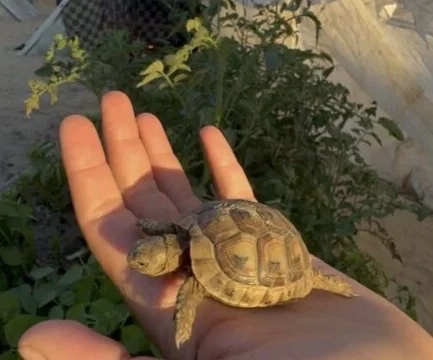Hope in the Face of Havoc
photo by Teresa Lu
Hope in the Face of Havoc
With the continued conflict in Gaza, forms of social media such as Instagram and Tiktok have become a new way of documenting hope and positivity among Palestinians.
by third year Teresa Lu
Hamad Shoqura, also known as @hamadashoo on tiktok, has become famous on the internet for his cooking videos during the ongoing famine in Gaza. Due to Israel cutting off Gaza’s food sources and aid being reduced due to attacks on relief teams, people like Hamad have become integral to the survival of his community.
“Pea Stew amidst the rubbles” “Drinking water rare commodity” “Smash cheese burger”
These are just a few of the titles of his videos, which shine a light on the thousands of meals he cooks throughout the week.
Hamad is supported by organizations such as the World Central Kitchen, and the United Nations Relief and Work Agency, who source food aid packages that he uses in his meals. However, a large part of his food comes from foraging, and finding whatever he can turn into nourishment. Khobeza, a plant that grows naturally in the Gaza strip, has become one of the main food sources for Gazans during a time of mass starvation. Not only Hamad, but the majority of civilians have created innovative dishes utilizing what they can find, from animal feed to natural growing herbs, and sharing them with the community.
The resourcefulness and resilience of the people in Gaza despite the immense tragedy they face is one that is both sad and inspiring. Despite all that they suffer from, whether it be displacement or detonating bombs, they have found a way to survive and resist. Food, which has become a given for the rest of the world, has become scarce and a matter of survival for Palestinians. With dwindling aid and increasing death, it is incomprehensible how Gazans manage to continue caring for one another and maintaining community in the most despairing times.
Bisan, a journalist on the ground in Gaza (@wizard_bisan1 on instagram), covers the conflict of Gazans as they fight for their lives and retain hope. She smiles when she finds her favorite flowers in a rare patch of grass, and jokes around with the kids in surrounding tents. Simultaneously, she covers the lack of restrooms and drinking water, and documents death tolls and missile strikes.
Medo Hamily (@medohamily on tiktok), was a tiktok influencer who vlogged his daily life in Gaza, from when he woke up to when he went to sleep. Medo created a challenge for himself: “planting something everyday until this genocide is over” His garden grew fast, and also became a source of food for himself and others. Proudly showing off his garden in multiple videos, it was clear that planting brought him joy. Medo always focused on the positive aspects of his life, a different and refreshing form of journalism covering the lives of people living in Gaza. When a commenter asked why he did it, Medo stated
“Planting for me is a form of resistance. I bring life to Earth. They’re taking away life, but I’m bringing it to Earth”
Murdered by an Israeli missile strike, Medo did not get to see his garden grow to its full potential.
It is easy to drown in despair and the hopelessness that comes from the Israeli-Palestinian conflict. It is easy to see what is happening in Gaza and want to shut our eyes, or lose sight of the future and any semblance of hope. But it is important that we acknowledge the resilient spirit of Palestinians, to see that if they can smile in the face of such tragedy, we can hear their stories with space for healing and the future.
Living in war and conflict, Gazans hold onto their humanity with dying grasps. Their story is one of sadness and despair, of injustice and hopelessness, but it is also one of resilience, culture, and community. The rest of the world watches on, holding their breaths and wondering what the last straw will be on Gaza’s back. But over and over, time and time again, surrounded by dying families and starving children, Palestinians demonstrate to us that hope is not found, it is fought for.
““I hope my plants have strong roots in the ground, just like us Palestinians do” ”



